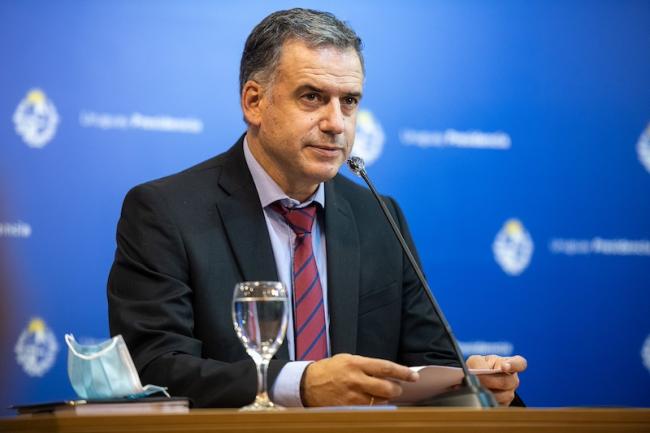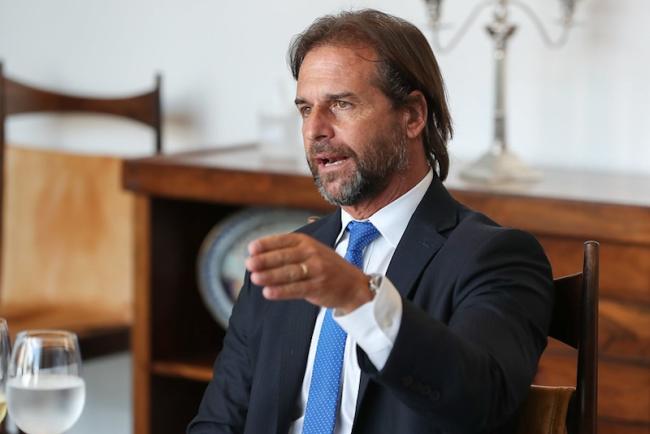
In November of 1984, when open elections were held in Uruguay for the first time after more than a decade of dictatorship, Yamandú Orsi was 17 years old. He remembers the democratic exercise as “a breath of fresh air” that “flooded through me, and there it has remained.” Orsi proceeded to get involved in local politics, and went on to become a high school history teacher in his hometown of Canelones, about an hour outside of Montevideo, before entering local politics in 2015. On Sunday, he was elected as Uruguay’s next president with the progressive Frente Amplio coalition. Orsi earned 49.8 percent of the vote in a tightly contested runoff against his opponent Álvaro Delgado of the Partido Nacional, who earned 45.9 percent.
In important ways, the context of his entry into politics has shaped his national and international outlook ever since. Coming of age in the wake of Uruguay’s most repressive period of rule, Orsi brings a moderate, civil, and democratic set of policies embedded in the social welfare framework of the Frente Amplio’s rule. These perspectives are likely to take center stage when he takes the oath of office in March 2025.
Entering Politics amid Dictatorship
Orsi was born in 1967, an inauspicious time in the nation’s history. Uruguay was dealing with a spiraling economic calamity while politicians faltered badly to get a grip on the crisis. Compounded by Cold War influences, military rule soon took over and most of Yamandú Orsi’s childhood was spent under the specter of the dictatorship, which lasted officially from 1973 to 1985.
Growing up in Canelones, his parents owned a small convenience store and stayed out of politics. As Orsi describes it, “politics was a dirty word” under the dictatorship, where even being suspected of leftist politics or opposing the military’s rule could get one arrested and perhaps even tortured. During that period, Uruguay had the dubious distinction of having the highest rate of political incarceration in the world, so that possibility loomed large.
The end of the repression inspired Orsi’s interest in politics. He obtained his degree from the Artigas Teaching Institute while becoming intimately involved in the debates and activism surrounding the country’s return to democracy. He joined political parties that eventually became part of the Frente Amplio coalition—first Vertiente Artiguista, a social democratic party, and then the Movimiento de Participación Popular, the political party of the former Tupamaros guerrilla movement (and future president José Mujica) and other more radical leftist groups when they reentered politics from the ballot box in 1990. It was during these initial years that Uruguay’s newly elected civilian government under Juan María Sanguinetti passed the Ley de Caducidad, an amnesty law for members of the military and police who committed crimes during the dictatorship. A popular referendum attempt to overturn it failed in 1989, and some of Orsi’s earliest political involvement included collecting signatures to overturn the law in Canelones.
Even so, it took many years before he formally sought a career in politics. Orsi taught high school history from 1991 to 2015, and it was only then that he became a politicians, having been elected to serve as mayor of Canelones. It was a position he held until March 2024, which was right as the elections for the presidency were getting underway.
A Close Runoff

The first round of voting took place on October 27, 2024, where Orsi captured 43.4 percent of the vote to Delgado’s 26.8 percent. Both fell short of the required 50 percent minimum, and the month-long runoff that followed featured polling that consistently put them neck-and-neck. Most of the political parties that failed to reach the runoff coalesced support behind Delgado to form a center-right coalition, a strategy that proved effective in the 2020 election that had launched Luis Lacalle Pou of the Nacional Party to the presidency.
Lacalle Pou emerged from tumultuous five years as president incredibly popular—maintaining even today close to 50 percent approval rating. His presidency began under extremely difficult conditions. He was inaugurated in March 2020, just weeks before the COVID-19 pandemic shut down much of the world. Yet, Uruguay avoided draconian lockdowns, and its strong, accessible health care system meant that the country, on a relative scale, did not suffer the same effects as many other nations in South America and around the globe. While Uruguay still experienced some of the inevitable economic brunt, Lacalle Pou was widely praised for his handling of the pandemic. He remained well-liked despite several corruption scandals during his administration, at least in part because of economic stability and his ability to attract foreign investment.
Delgado represents the same party as Lacalle Pou and in fact served as secretary of the presidency under him. Delgados’ frequent press conferences during the pandemic both gave him visibility and linked him to Lacalle Pou’s legacy, which he promised to continue during the campaign. Yet, it was not enough to get him elected.
While Delgado’s vote percentage increased by over 19 points in the runoff, compared to only a 6.4 percent gain for Orsi, it wasn’t enough to break the Frente Amplio’s lead that ultimately propelled the coalition back to the presidency. Orsi, however, will face several challenges when he takes office in March 2025.
Poverty and Security
First and foremost is the issue that most voters listed as their top concern—insecurity and crime. Uruguay’s reputation as a peaceful nation has slowly started to erode amid the rising effects of transnational drug rings operating within its borders. Uruguay now possesses one of the highest rates of homicide in the region, at 11.2 per 100,000 inhabitants. By comparison, Chile’s rate is only 4.5 and the United States is 5.7, putting Uruguay’s at almost double. In response, the country voted in October on a constitutional referendum to allow the police to conduct nighttime raids. Despite initial polls showing an overwhelming majority of the population in favor, debates about the effects of the legislation—and possibly the long reach of the legacy of military rule and fears of empowering the military at the expense of civil rights—ultimately swayed voters to vote against it.
Orsi, the Frente Amplio, and even the police union ultimately came out against the measure, questioning whether the initiative would make a measurable difference in fighting drug trafficking and at what expense. Orsi’s campaign focused on Lacalle Pou’s failure to meaningfully bring down the crime rates, while speaking without much specificity on his own policies beyond boosting funding to the overcrowded prison system and cooperating with European countries to tackle transnational crime. In broad terms, the Frente Amplio offered a root causes approach to fighting crime, seeking to address poverty and social exclusion.
The Partido Nacional, for its part, centered its strategy on supporting expanded police powers and more punitive measures. If this, indeed, was the most important voter issue when heading to the ballot box, it appears that five years of Lacalle Pou’s approach has convinced voters to give the Frente Amplio’s more holistic approach a try.
The other major issue of the campaign centered on the high cost of living, which disproportionately affects lower-income populations. Uruguay’s child poverty rate is at 20 percent and the country also has a high rate of homelessness. To address this issue, Orsi promised to reform the massive pension overhauls launched by Lacalle Pou’s government to ensure it guarantees greater access for all to its benefits. He has also outlined a multi-pronged strategy to address childhood poverty that includes childcare subsidies and increasing cash transfers for vulnerable households.
A New Generation for the Frente Amplio
Other issues highlight the ways the legacy of dictatorship influence Orsi’s politics. The first is his democratic outlook on the global stage, such as in regards to Venezuela. Nicolás Maduro sent a congratulatory message to the Orsi and his vice president, Carolina Cosse, soon after Delgado conceded, and he is right to assume that Orsi’s rhetoric towards Venezuela won’t be as inflammatory as under Lacalle Pou. Yet, Maduro is perhaps misplaced in thinking that Orsi will embrace him. Orsi has called Maduro’s electoral fraud and domestic political crackdowns “indefensible,” an opinion largely rooted in observing the damaging effects of the absence of democratic norms in Uruguay during his youth.
Another issue of national concern involves the continued search for the disappeared during Uruguay’s dictatorship and accountability for the crimes that took place during this era. Recent excavations of military bases are widely supported across the country. Since 2019, an office set up by the last Frente Amplio government to conduct these archaeological digs is slowly unearthing remains that were disappeared over 40 years ago. These excavations proceeded even under Lacalle Pou’s conservative government and are largely projected to continue under Orsi, even though the process is painstakingly slow as the military has maintained silence over the years.
The question of accountability is more complex. The 1989 amnesty law that Orsi advocated against was officially overturned in 2011, following the Inter-American Court of Human Rights ruling Gelman v. Uruguay, in which the court determined that the Ley de Caducidad, as a blanket amnesty, was incompatible with international law. Even so, trials were slow to proceed and faced resistance from the military. The Frente Amplio has often focused on broad social welfare measures, not spending the necessary political capital to push the trials forward.
The Partido Nacional was even more resistant, as evidenced by its reticence and resistance in complying with the 2021 Inter-American Court ruling in Maidanik y otros v. Uruguay, the second case in which the Court found the country liable for crimes committed during the dictatorship. Lacalle Pou had entered a governing coalition with the newly formed far-right Cabildo Abierto party, who staked much of its governing platform on reactionary policies, including trying to have the few members of the military who had been convicted of dictatorship-era crimes released to house arrest. Lacalle Pou failed to engage directly in many of the Court’s reparations orders, signaling an important distancing from the accountability politics of the Frente period from 2005 to 2020.
Whether Orsi will pursue a stronger position on accountability is yet to be seen. The Cabildo Abierto lost many of its seats in Parliament—it holds only 2 now in the lower house—but the Frente Amplio does not have a majority in the Chamber of Representatives. Orsi will be forced to work with other parties to get legislation passed, an impulse he spoke to in his victory speech after making repeated calls for national dialogue in the largely civil presidential campaign.
Orsi comes from a different generation of Frente Amplio presidents. He is just the third Frenteamplista in the country’s history to hold the vaunted position behind Tabaré Vázquez (2005-2010 and 2015-2020) and José “Pepe” Mujica (2010-2015), who were adults during the dictatorship and already politically involved at the onset of the dictatorship. Mujica famously spent the period being tortured by the military in horrible prison conditions due to his involvement in the Tupamaros. This second generation of Frente Amplio politicians represented by Orsi grew up and became politically conscious during the military’s rule, but the impact of that repression has influenced them in formative ways. While continuing to grapple with the period’s legacies, the country has demonstrated a desire to return to a more humanistic, social welfare-centered approach to politics in a marked departure from some rightward-leaning trends in the region. Orsi will have the chance to lead that vision starting in March 2025.
Debbie Sharnak is Assistant Professor of History and International Studies at Rowan University and the author of Of Light and Struggle: Social Justice, Human Rights, and Accountability in Uruguay, and co-editor of Uruguay in Transnational Perspective.

